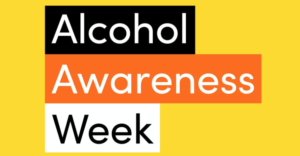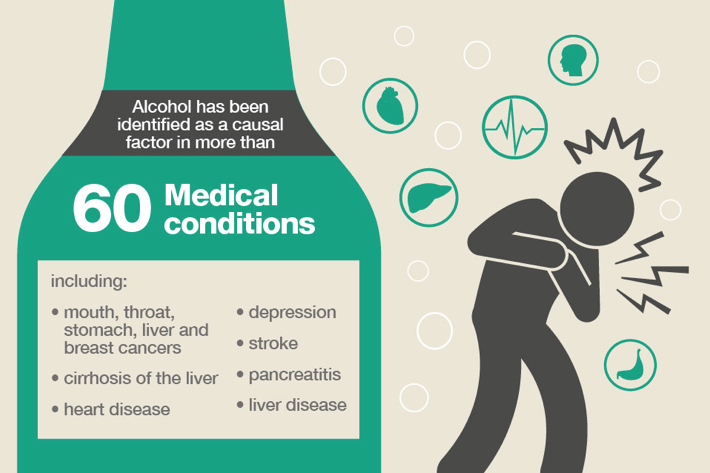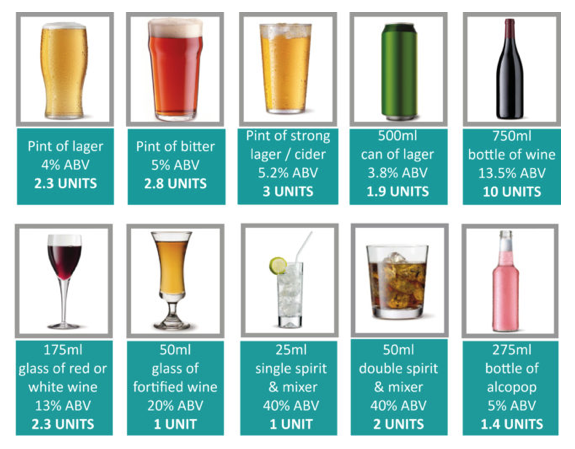Alcohol Awareness
Alcohol Change UK are holding an Alcohol Awareness Week 2020 which will take place from 16-22 November 2020 on the theme of Alcohol and mental health. They are a charity that works for a society that is free from the harm caused by alcohol.
The information here explains the health risks of alcohol, the drinking limits and how to find out how much you are drinking, plus where to get help with alcohol related problems.

Health risks of drinking alcohol
Many people enjoy having a drink from time to time. However, as we grow older alcohol takes longer for our body to process and the few beers you could drink in your 30s without consequence now have more impact. In addition, with eyesight and balance deteriorating, the risk of falling increases further after drinking alcohol. Hence, though this is directed at those drinking more than they should, as we age, we all should review how much we can safely drink.
As part of Alcohol Awareness week in November 2020 Alcohol Change UK have a variety of information leaflets available to advise on drinking alcohol and how this impacts on your health and wellbeing.

What are the drinking limits?
There are no safe limits on how much you can drink, but by following guidance on low risk limits you can take steps to limit the effects that alcohol has on your health and wellbeing.
Regular drinkers
If you are a regular drinker (meaning you drink most weeks), current guidelines recommend not drinking more than 14 units of alcohol each week. If you do, try to spread them out evenly over at least three days of the week. The recommended weekly limit of 14 units is equivalent to 6 pints of average-strength beer or 10 small glasses of low-strength wine.
Tip: A helpful way to cut back on your intake is to have some drink-free days each week.
Occasional drinkers
If you like to have a drink from time-to-time, it is important to be aware of the risks associated with occasional drinking. Drinking too much, too quickly, or on an empty stomach can increase your risk of accidents or injury. Try to keep yourself safe by:
- limiting the amount of alcohol you drink at any one time
- drinking slowly, and having some drinks of water between alcohol
- making sure you have had something to eat before drinking alcohol
- drinking with people around you that you know.
How do I know how much I am drinking?
People often underestimate their units, e.g. one large glass of wine is 3 units (depending on %), so 3 large glasses equates to nearly a full bottle of wine. People often underestimate calories too, one large glass is the same as an ice cream.

If you are unsure on how much you are drinking, use the Alcohol Change UK calculator
How can alcohol affect my health?
By drinking regularly and more than 14 units a week, alcohol can affect your physical health, these include increasing the risk of:
- Stroke
- Cancers of the mouth, throat and breast
- Heart disease
- Liver disease
- Brain damage
- Weight gain
- Damage to the nervous system
The effects of alcohol on your health will depend on how much you drink. The less you drink, the lower the health risks.
Can alcohol affect my mental health?
Yes. Research has found strong links between alcohol misuse and self-harming, including suicide. Sometimes people use alcohol as a way of making them feel relaxed. However, although alcohol can help us feel relaxed initially and give us a brief feeling of euphoria, the effects are short-lived and the long-term negative consequences of drinking a lot over a long period of time can be quite harmful.
- Overuse of alcohol can contribute to the worsening of symptoms of many mental health problems. In particular, it can lead to low mood and anxiety.
- As the immediate feeling of calm after drinking fades over time, you may feel worse than before.
- Post-drinking hangovers can be particularly difficult, with the usual headache and nausea being accompanied by feelings of depression and/or anxiety.
- Using alcohol in this way can mean that the underlying mental health problems aren’t addressed.

Where can I find out more about the risks of drinking too much alcohol?
To find out find out more about the health risks linked with alcohol, visit the NHS website.
What if I have become too reliant on alcohol?
Realising you are becoming too reliant on alcohol is the first step to making a change and there is lots of support available to help you drink less. You should consider getting help if:
- you feel the need to have a drink is increasing
- you're having accidents or having falls
- friends and family comment on how much you are drinking
- you think your drinking is causing you problems.
Where can I get help?
A good place to start is talking to your GP. You will need to be open and honest about how much you are drinking and the problems this is causing you. Your GP will refer you to a local alcohol support group.
Self-help groups (such as AA or SMART Recovery) are accessible in most areas.

Useful contacts for alcohol problems
Drinkline is the national alcohol helpline. If you're worried about your own or someone else's drinking, you can call this free helpline in complete confidence.
Call 0300 123 1110 (weekdays 9am to 8pm, weekends 11am to 4pm).
Alcoholics Anonymous
Alcoholics Anonymous (AA) is a free self-help group. Its "12 step" programme involves getting sober with the help of regular support groups.
Visit the Alcoholics Anonymous website
Al-Anon Family Groups
Al-Anon Family Groups offers support and understanding to the families and friends of problem drinkers, whether they're still drinking or not. Alateen is part of Al-Anon and can be attended by 12 to 17-year-olds who are affected by another person's drinking, usually a parent.
OK Rehab
OK Rehab is a recovery advocate service. They help you to find the best addiction rehab for your needs, focussing on treatment that promotes lifestyle changes.
We Are With You
We Are With You is a UK-wide treatment agency that helps individuals, families and communities manage the effects of drug and alcohol misuse.
Visit the We Are with You website
Adfam
Adfam is a national charity working with families affected by drugs and alcohol. They operate an online message board and a database of local support groups.
NACOA - The National Association for Children Of Alcoholics
The National Association for Children of Alcoholics provides a free, confidential telephone and email helpline for children of alcohol-dependent parents and others concerned about their welfare. Call 0800 358 3456 for the Nacoa helpline.
SMART Recovery
SMART Recovery groups help people decide whether they have a problem, build up their motivation to change, and offer a set of proven tools and techniques to support recovery.
Visit the SMART Recovery website
DrinkAware
Drinkaware offers advice on how to reduce drinking and help people make better choices about drinking.
They also have a free Drinkaware app which helps you to change the way you drink. Download it from our App Corner page under 'Health'.
